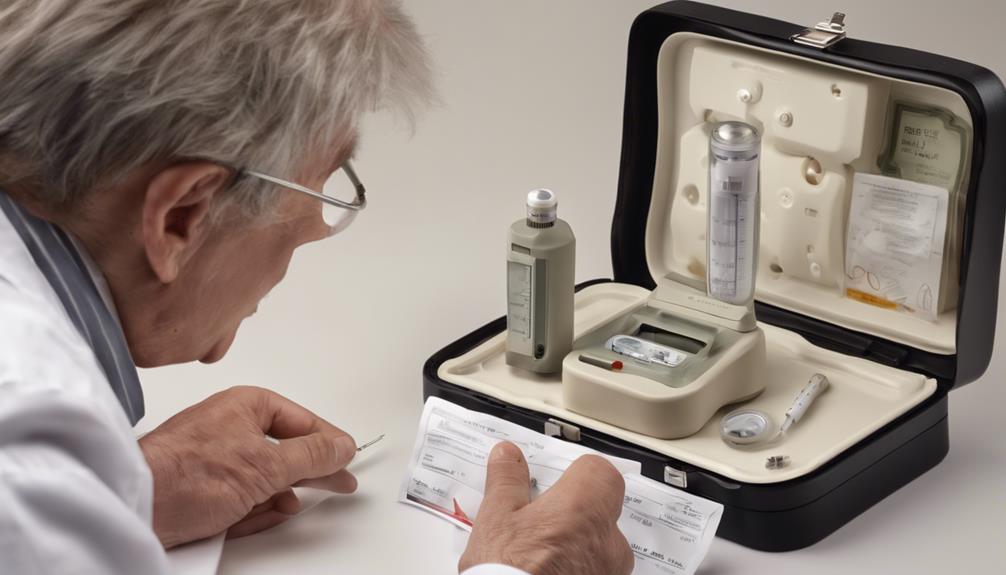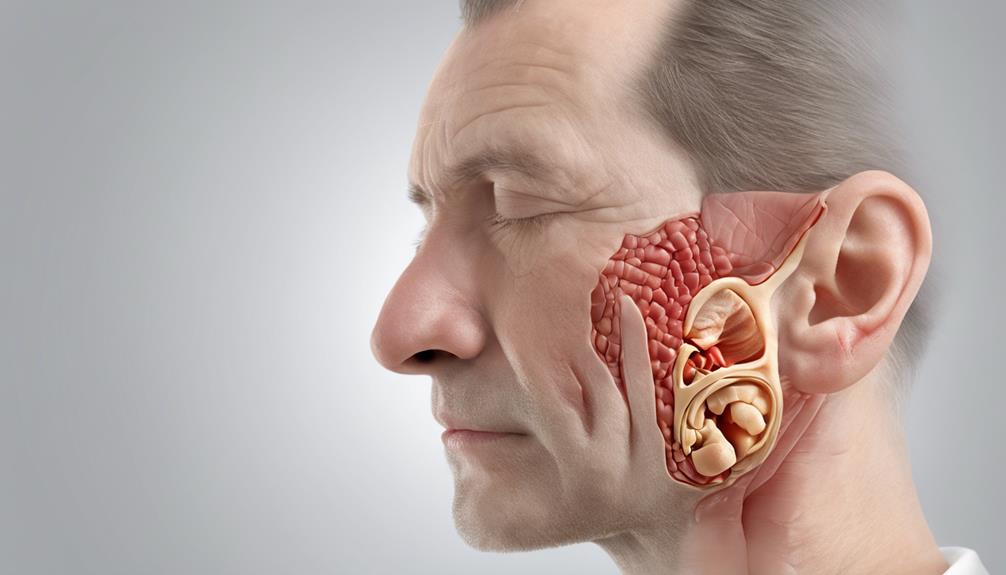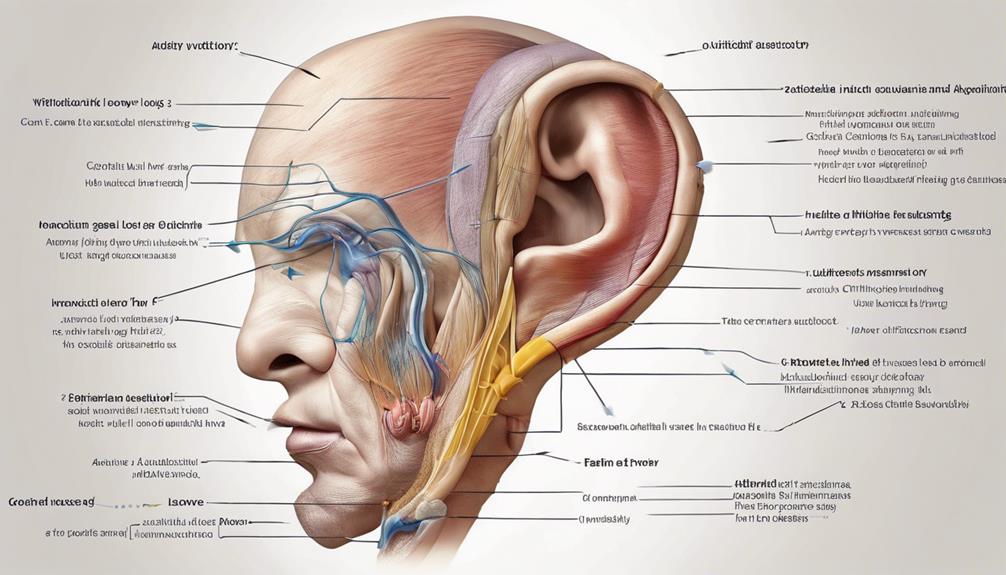Imagine waking up one morning with a sore throat, only to realize it’s actually strep throat, a common bacterial infection.
Did you know that untreated strep throat can lead to complications like hearing loss?
The link between these seemingly unrelated issues is more significant than one might think, affecting individuals of all ages.
Understanding how strep throat can impact hearing health is crucial, but what steps can be taken to prevent this potentially serious outcome?
Key Takeaways
- Strep throat can progress to otitis media, impacting hearing.
- Timely treatment of strep throat prevents temporary hearing impairment.
- Recognize strep throat symptoms early to avoid complications.
- Proper management of strep throat mitigates risks of hearing loss.
Understanding Strep Throat and Hearing Loss
Strep throat and hearing loss are intricately linked as streptococcal infections in the throat can lead to otitis media, a common ear infection causing temporary hearing impairment. When these infections spread to the middle ear, they can disrupt sound transmission due to the accumulation of fluid. This fluid buildup interferes with the movement of the tiny bones responsible for conducting sound waves, resulting in a decrease in hearing acuity.
Fortunately, most cases of hearing loss associated with strep throat are reversible with prompt and appropriate treatment. However, if left untreated or if the infections persist, permanent damage to the middle ear structures can occur, leading to long-term hearing difficulties. It's essential to recognize the signs of strep throat early on and seek medical attention to prevent complications like middle ear infections and subsequent hearing loss.
Maintaining ear health through timely intervention is crucial in preserving hearing function and overall well-being.
The Connection Between Strep Throat and Ear Infections

When streptococcal infections in the throat progress to the middle ear, they can disrupt sound transmission, potentially causing reversible hearing impairment. Strep throat, if left untreated, can lead to complications such as ear infections, specifically otitis media, which affects the middle ear.
In otitis media, the infection can interfere with the proper functioning of the ear, hindering the transmission of sound waves from the eardrum to the inner ear where sound is processed. This disruption in sound conduction can result in temporary hearing loss.
The middle ear plays a crucial role in the auditory process, and any infection in this area can impact hearing abilities. Prompt treatment of strep throat is essential to prevent such complications from developing and affecting the delicate mechanisms of the inner ear.
Understanding the connection between strep throat and ear infections underscores the importance of addressing throat infections promptly to safeguard the intricate auditory system from potential harm.
Impact of Strep Throat on Auditory System
Progressing from streptococcal infections in the throat to the middle ear, the impact of strep throat on the auditory system can manifest in disruptions to sound transmission and potential reversible hearing impairment.
Strep throat can lead to otitis media, a condition where the middle ear becomes inflamed and infected. Infections in the middle ear can hinder the movement of sound waves, affecting the transmission of auditory signals to the brain.
The presence of infective material in the middle ear can contribute to hearing loss, with issues such as reversible deafness and even rare cases of permanent hearing impairment. Prolonged strep throat infections that progress to the middle ear can lead to complications like ruptured eardrums, further exacerbating hearing problems.
Timely medical intervention for middle ear infections resulting from strep throat is crucial to prevent long-term consequences, such as irreversible hearing loss. Understanding the potential impact of strep throat on the auditory system highlights the importance of prompt treatment to preserve hearing function and overall well-being.
Recognizing Symptoms of Hearing Loss From Strep Throat

Upon experiencing symptoms of hearing loss from strep throat, individuals should promptly seek medical evaluation to prevent potential complications. Recognizing the signs of hearing impairment is crucial in addressing the issue effectively. Here are four key indicators to watch for:
- Muffled Hearing: A common symptom of hearing loss associated with strep throat is a sense of reduced clarity in sounds, as if they're being heard through a barrier.
- Difficulty Understanding Speech: Struggling to comprehend conversations or needing people to repeat themselves frequently could point towards hearing issues.
- Ringing in the Ears: Tinnitus, or perceiving ringing, buzzing, or hissing sounds in the ears without an external source, might indicate underlying hearing problems.
- Ear Pain and Dizziness: Unexplained ear discomfort, fluid leakage from the ear, or feelings of unsteadiness can also be warning signs of potential hearing loss from streptococcal infections.
Being vigilant about these symptoms and seeking timely medical intervention can help in managing hearing loss effectively.
Prevention Tips for Avoiding Hearing Complications
To prevent hearing complications related to strep throat, implementing proper treatment and maintaining good ear hygiene practices is essential. Proper treatment of strep throat infections can help prevent secondary ear infections that may lead to hearing loss. Seeking timely medical intervention is crucial to avoid irreversible damage to the ears caused by untreated strep throat.
It's important to avoid self-medication and instead consult healthcare professionals for appropriate treatment, reducing the risk of developing hearing complications. Regular check-ups with an Ear, Nose, and Throat (ENT) specialist can aid in the early detection and management of any potential ear infections related to strep throat, minimizing the impact on hearing.
Additionally, maintaining good ear hygiene practices, such as keeping the ears clean and dry, can significantly lower the chances of developing infections that could compromise hearing health. By following these prevention tips and seeking proper medical care, individuals can safeguard their ears from potential complications associated with strep throat.
Frequently Asked Questions
Can Strep Throat Cause You to Lose Your Hearing?
Yes, strep throat can indeed cause hearing loss. The infection can lead to complications like otitis media, resulting in temporary or reversible deafness.
In severe cases, prolonged infections from streptococcal bacteria can contribute to permanent hearing impairment. Seeking timely medical care for strep throat is essential to prevent potential complications, including irreversible hearing loss that may require treatments like antibiotics or even surgical intervention.
Can Streptococcus Cause Hearing Loss?
Yes, streptococcus can cause hearing loss.
Infections from streptococcal bacteria can lead to complications like otitis media, which may result in poor sound transmission and hearing issues.
If left untreated, these infections can lead to reversible deafness or even permanent hearing loss.
Therefore, timely treatment of streptococcal infections is crucial to prevent such consequences.
Seeking medical intervention early on is key to maintaining auditory health.
How Do You Prevent Strep Throat After Exposure?
After exposure to strep throat, we prevent infection by practicing good hygiene. We wash hands frequently and avoid close contact with infected individuals.
Strengthening our immune system is vital; it involves maintaining a healthy diet, staying hydrated, and ensuring adequate rest. Using disinfectants on possibly contaminated surfaces can also help.
If exposure is suspected, consulting a healthcare provider for guidance on preventive measures or potential antibiotic treatment is crucial.
Can Strep Throat Cause Inner Ear Problems?
Yes, strep throat can indeed cause inner ear problems. The infection can lead to issues like otitis media, affecting the middle ear and potentially leading to hearing loss. Streptococcal bacteria can harm sound transmission in the inner ear, resulting in reversible deafness.
If left untreated, severe cases of strep throat can even cause permanent hearing loss by impacting the function of the ear drum and middle ear. Early treatment is crucial to prevent these complications.
Conclusion
In conclusion, preventing strep throat is crucial in avoiding potential hearing loss.
By understanding the connection between strep throat and ear infections, recognizing symptoms of hearing impairment, and taking preventive measures such as proper treatment and regular check-ups, we can help safeguard our auditory health.
Remember, an ounce of prevention is worth a pound of cure when it comes to protecting our ears from the silent threat of strep throat.










